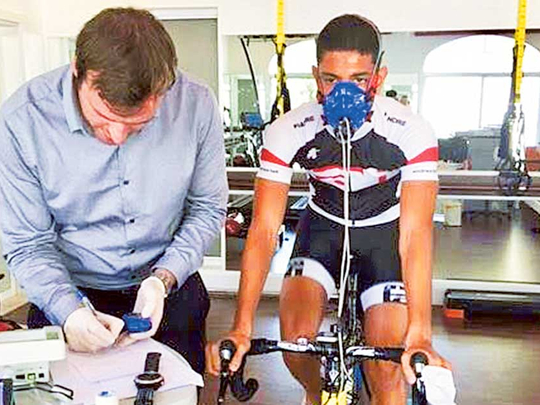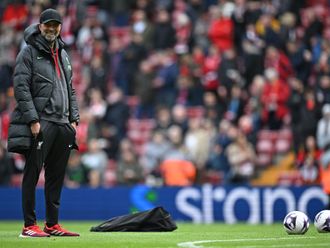
Dubai: In 2015 Dubai-based physiologist Dr. Ramzy Ross tricked athletes into believing they were trialling a new type of performance enhancing substance, when really all they were injecting was saline, which is water with salt in it.
Of course, there was no biological benefit, but the mental effect of simply believing they were on something helped raise physical performance by 1-2 per cent, which is the difference between finishing 12th and first at an Olympics.
What he now wants to do — using this same Placebo Effect — is to trick an entire nation into enjoying exercise in order to combat the UAE’s obesity and diabetes pandemic.
“I’m interested in the limitations of the human body and why we stop when we stop,” said the 30-year-old from the University of Glasgow. “Physiologically the human body can only improve so much, mechanically it is limited, but we haven’t spoken about the mind.
“We shout and scream when we are on that last bench press, but in reality we aren’t recruiting all of our muscle fibres. Why can’t we?
“In the context of endurance performance, Professor Tim Noakes at the University of Cape Town says it’s our body’s way of protecting itself. But in reality we are highly unlikely to have a heart attack by simply pushing ourselves that little bit more.”
The Placebo Effect in regards to doping may have been deemed unethical, as it breaches trust between coach and athlete, and even though no test is failed because no drug is taken, it still exposes the athlete as having that initial intention to cheat.
Beyond this however, it showed — quite simply — that there was the potential to play with the mind in order to increase physical output and make effort seem easier.
“How can we learn from this to get the average person on the street exercising more to improve the health of a nation?” asks Ross.
Well, not everyone has access to fake steroids, but there have been follow-up studies by Professor Samuele Marcora at the University of Kent, using more obtainable means.
His research looks at how exercise is perceived to be easier when caffeine is ingested or brain games are played just minutes before exertion.
There could be both a biological and psychological effect to this and it’s this psycho-biology that could hold the key to countering a sedentary lifestyle.
“If exercise is perceived to be easier, then we are more likely to stick to it and in the long term that could help the UAE with its wider public health concerns.
“In fact, placebos would have more of a profound effect at lower levels because there’s so much room for change, whereas when you work with an elite athlete there are smaller, more marginal, gains.”
It is those marginal gains at elite level that could help break the sub two-hour marathon, however.
The current record is two hours, two minutes, and 57 seconds set by Kenya’s Dennis Kimetto at the Berlin Marathon in 2014.
Nike aims to break the two-hour barrier in 2017, and Ross says placebos might help.
“It could be one contributor,” said Ross, who worked with Ethiopia’s Haile Gebrselassie ahead of his failed bid to break the world record at the Dubai marathon in 2009.
“Numerous things need to be done and numerous situations just have to happen at the right time and the right place in order for it to be achieved.
“I’m an optimist and think ‘why not?’ with Nike’s funding, infrastructure and specialists it could be done. But, again, they are going to need all elements, some of which are out of their control, to click at the same time, including a bit of luck.”
- Dr. Ramzy Ross is a physiologist working as an independent consultant in the UAE. He aims to improve the health of a nation while supporting talented young Emirati athletes reach the highest level. He has worked closely with the Ministry of Education and the UAE Armed Forces to improve fitness from school to national service.












